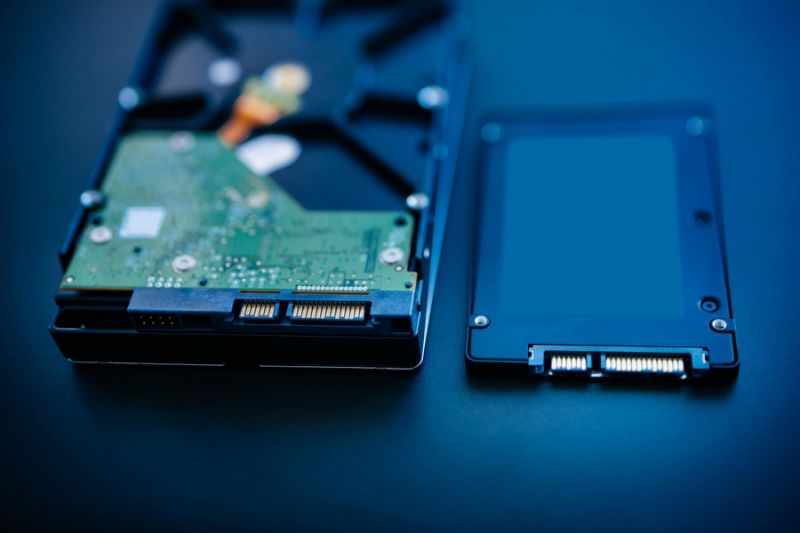Time for a vacation! Most people opt for steady and usually reliable air travel when taking long trips, even with the threats of canceled flights or lost luggage. But what if teleportation could deliver you to the beach in a flash of light?
Believe it or not, there are similar considerations with storing information. As with air travel, hard disk drives (HDDs) are the more established devices, even though they’re slower and tend to break on occasion. Travelers or site owners who opt for solid-state drives (SSDs) may spend more money up front, but the gained speed and reliability make the drives (and teleportation) plenty worthwhile.
We constantly
What’s the Difference Between HDD and SSD?
Whether you’re buying a new laptop or shopping for a web server, you’ll want to know how your files will be stored and accessed. Hard disk drives store large amounts of data very cheaply, but the mechanical nature of a spinning disk and read/write head hampers performance and makes the units more susceptible to failure.
Solid-state drives are more expensive but provide a noticeable boost to performance. By storing information on interconnected flash-memory chips, SSDs have no moving parts. The newer technology means that storage capacity of SSDs tends to be lower, but hosting providers often tout how the upgraded hardware can make page loads up to 20 times faster.
5 Comparisons Measuring SSD and HDD Performance
As the price-per-gigabyte chasm between SSDs and HDDs continues to shrink (experts expect the gap will close between 2018 and 2020), more and more people are flocking to SSDs in a variety of uses. In 2014, SSDs powered 21% of all laptops; researchers forecast that number would double by 2017. Conversely, HDD implementation was expected to fall from 79% in 2014 to 59% in 2017.

With SSD pricing quickly becoming a non-issue, here are five other ways to compare HDDs and SSDs to see which option might be best for you.
1. SSD vs. HDD: Speed
When comparing the two storage drives, the speed at which data is written and read is the distinguishing factor between HDDs and SSDs. The former uses magnetism to store data on a rotating platter; the faster the platter spins determines how quickly information can be stored. SSDs, however, use flash memory and an embedded processor to store data.
SSDs provide noticeable performance upgrades, both for consumer-grade computers and web hosting servers. Many of our favorite hosts that operate all-SSD infrastructure, including ASPHostPortal, HostForLIFEASP.NET, and UKWindowsHostASP.NET, say the configuration leads to page loads that are up to 20 times faster.
2. SSD vs. HDD: Reliability
Because there are no moving parts, SSDs tend to be more durable and can better withstand the various bumps or jolts your computer experiences. The read/write process doesn’t degrade, and SSDs will maintain data integrity for more than 200 years.
With platters that spin at 7,200 rotations (or more) per minute, the mechanisms inside HDDs are not only subject to more wear and tear, but they are more susceptible to damage if dropped or bumped.
3. SSD vs. HDD: Lifespan
You know the saying, “speed kills.” While that may be a little exaggerated when it comes to storage devices, it does hold a grain of truth. SSD cells can wear out over time, slowly losing performance before dying. According to many, though, SSD users are far more likely to replace their storage drive because of obsoleteness than for suffering from a shorter lifespan.
As for HDDs, the argument is much the same with durability: Moving parts leave more room for things to fail. With only a few nanometers separating the platter and read/write head, any accidental contact can lead to data loss or complete failure.
4. SSD vs. HDD: Power Consumption
This comparison can be illustrated pretty simply. Which takes more energy: running a marathon or tapping buttons on the remote while lying on the couch? HDDs need to spend extra electricity spinning up a stationary platter and moving the read/write head around, while the electricity SSDs use is solely devoted to storing data — no movement, friction, or extraneous noise.
For desktop computers and servers, SSDs equal lower energy bills. On laptops or tablets, users can typically squeeze out a few extra minutes or hours of battery life with SSDs.
5. SSD vs. HDD: Gaming
Resource-intensive computer games provide an excellent test of pushing both storage devices to the limit. However, SSDs make very little difference in gameplay performance. Framerate issues won’t be solved by a storage device; those require an upgraded graphics processing unit, or GPU. Some gamers have reported that SSDs can reduce hitching, or the brief pauses when the games can’t pull assets from the hard drive fast enough to keep up with the player.
Overall, SSDs and HDDs are effectively the same when it comes to the action on the battlefield. The SSD benefits to gamers, however, are the same experienced by other PC users: faster boot times and quicker game loading.
Best of Both Worlds? SSD and HDD Combo Hybrids
You’ll have to spend a lot of time reading the fine print to find a web hosting plan with both HDD and SSD storage, but they do exist — particularly at the VPS and dedicated server levels, which allow for much more flexibility when crafting your hosting architecture.
For personal computing, however, you don’t necessarily have to choose between storage capacity or speed. We’ve already shared how you can create your own hybrid desktop or laptop when upgrading your operating system to an SSD, but hardware vendors have begun manufacturing and selling combination drives, sometimes called SSHDs for solid-state hybrid drives, as individual components or as a feature on a full computer. With computer storage, hard disk drives and solid-state drives are a win-win situation — stronger together than apart.
